4HR002 Reflective Journal: Analyzing Future Employment Factors
VerifiedAdded on 2022/08/25
|9
|2394
|15
Journal and Reflective Writing
AI Summary
This reflective journal assignment, submitted by a student, delves into the critical factors influencing future employment choices, as explored in the 4HR002 Introduction to People at Work module. The student begins by outlining their initial considerations, including salary, educational opportunities, growth prospects, benefits, good working relationships, working hours, fair treatment, varied work, passion, and company mission. The journal then examines how the module's topics, such as teamwork, rewards, staff welfare, employee development, fairness, and psychological contracts, have shaped their perspectives. The student reflects on changes in their views regarding work, emphasizing the importance of factors beyond financial rewards, such as employee development, staff welfare, and fair treatment in the workplace. The journal concludes with a summary of the key insights gained, highlighting the student's evolving understanding of the work environment, career challenges, and the importance of considering various aspects of a job beyond compensation. The student also stresses the significance of the module's lessons for future career planning.
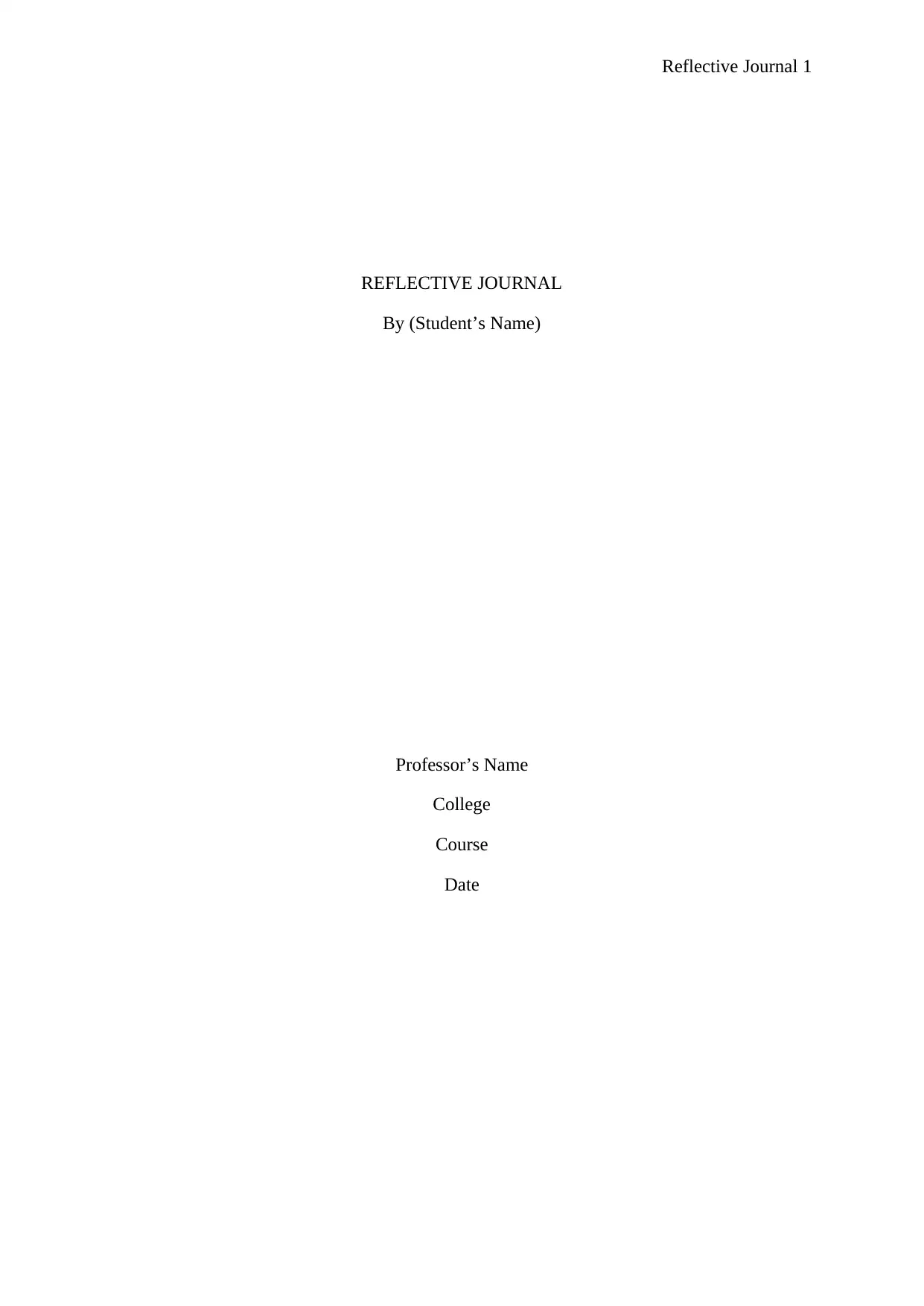
Reflective Journal 1
REFLECTIVE JOURNAL
By (Student’s Name)
Professor’s Name
College
Course
Date
REFLECTIVE JOURNAL
By (Student’s Name)
Professor’s Name
College
Course
Date
Paraphrase This Document
Need a fresh take? Get an instant paraphrase of this document with our AI Paraphraser
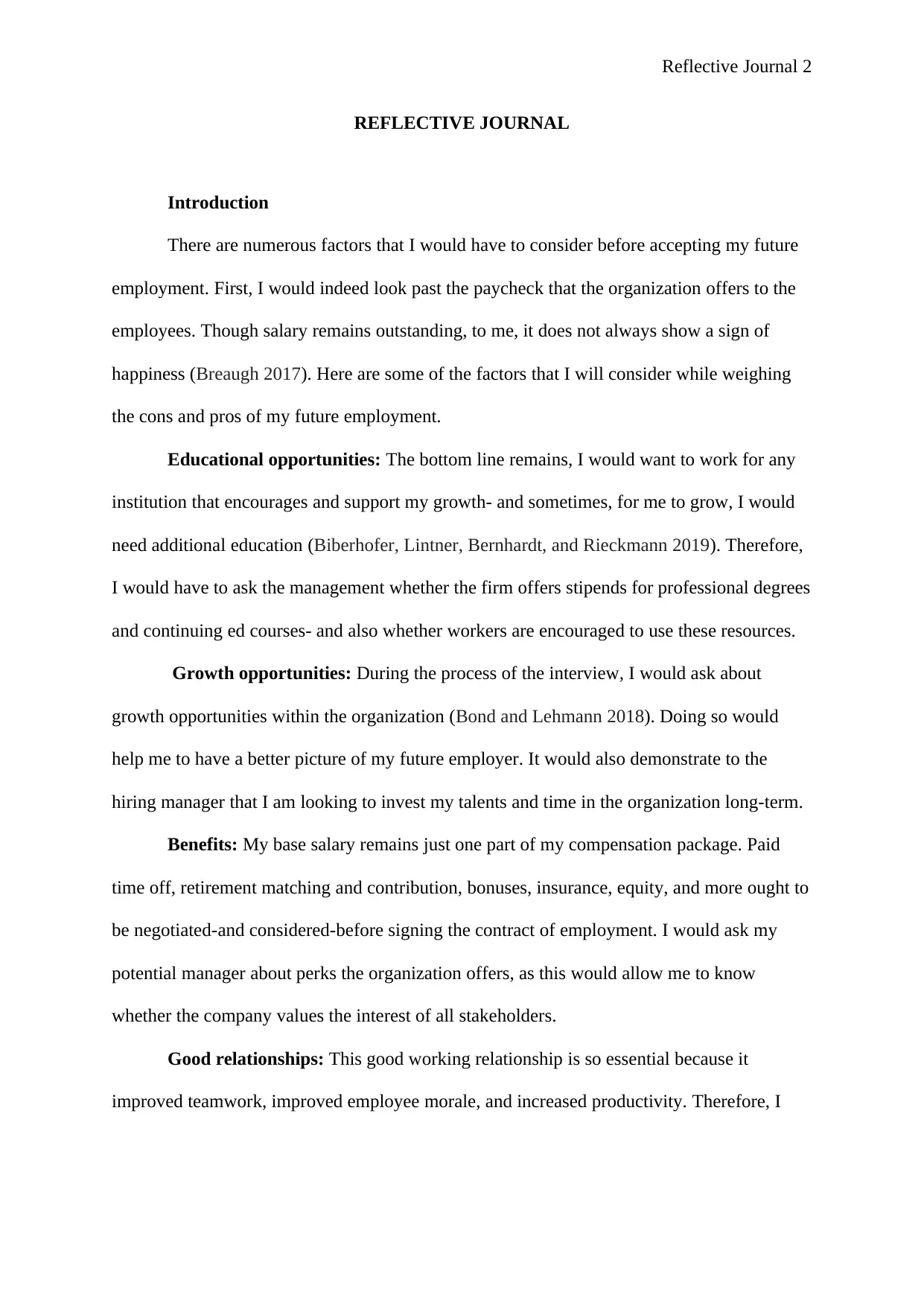
Reflective Journal 2
REFLECTIVE JOURNAL
Introduction
There are numerous factors that I would have to consider before accepting my future
employment. First, I would indeed look past the paycheck that the organization offers to the
employees. Though salary remains outstanding, to me, it does not always show a sign of
happiness (Breaugh 2017). Here are some of the factors that I will consider while weighing
the cons and pros of my future employment.
Educational opportunities: The bottom line remains, I would want to work for any
institution that encourages and support my growth- and sometimes, for me to grow, I would
need additional education (Biberhofer, Lintner, Bernhardt, and Rieckmann 2019). Therefore,
I would have to ask the management whether the firm offers stipends for professional degrees
and continuing ed courses- and also whether workers are encouraged to use these resources.
Growth opportunities: During the process of the interview, I would ask about
growth opportunities within the organization (Bond and Lehmann 2018). Doing so would
help me to have a better picture of my future employer. It would also demonstrate to the
hiring manager that I am looking to invest my talents and time in the organization long-term.
Benefits: My base salary remains just one part of my compensation package. Paid
time off, retirement matching and contribution, bonuses, insurance, equity, and more ought to
be negotiated-and considered-before signing the contract of employment. I would ask my
potential manager about perks the organization offers, as this would allow me to know
whether the company values the interest of all stakeholders.
Good relationships: This good working relationship is so essential because it
improved teamwork, improved employee morale, and increased productivity. Therefore, I
REFLECTIVE JOURNAL
Introduction
There are numerous factors that I would have to consider before accepting my future
employment. First, I would indeed look past the paycheck that the organization offers to the
employees. Though salary remains outstanding, to me, it does not always show a sign of
happiness (Breaugh 2017). Here are some of the factors that I will consider while weighing
the cons and pros of my future employment.
Educational opportunities: The bottom line remains, I would want to work for any
institution that encourages and support my growth- and sometimes, for me to grow, I would
need additional education (Biberhofer, Lintner, Bernhardt, and Rieckmann 2019). Therefore,
I would have to ask the management whether the firm offers stipends for professional degrees
and continuing ed courses- and also whether workers are encouraged to use these resources.
Growth opportunities: During the process of the interview, I would ask about
growth opportunities within the organization (Bond and Lehmann 2018). Doing so would
help me to have a better picture of my future employer. It would also demonstrate to the
hiring manager that I am looking to invest my talents and time in the organization long-term.
Benefits: My base salary remains just one part of my compensation package. Paid
time off, retirement matching and contribution, bonuses, insurance, equity, and more ought to
be negotiated-and considered-before signing the contract of employment. I would ask my
potential manager about perks the organization offers, as this would allow me to know
whether the company values the interest of all stakeholders.
Good relationships: This good working relationship is so essential because it
improved teamwork, improved employee morale, and increased productivity. Therefore, I
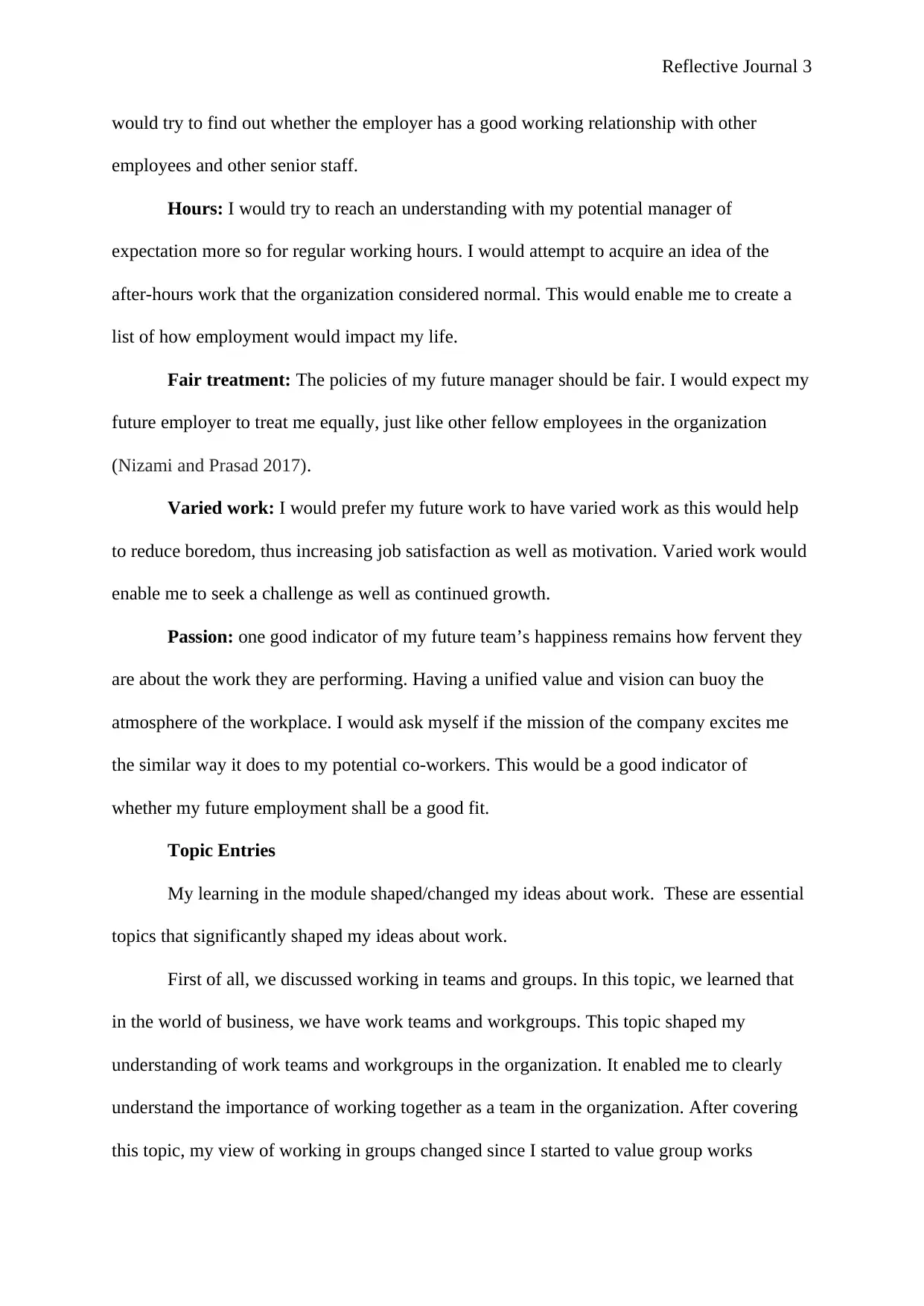
Reflective Journal 3
would try to find out whether the employer has a good working relationship with other
employees and other senior staff.
Hours: I would try to reach an understanding with my potential manager of
expectation more so for regular working hours. I would attempt to acquire an idea of the
after-hours work that the organization considered normal. This would enable me to create a
list of how employment would impact my life.
Fair treatment: The policies of my future manager should be fair. I would expect my
future employer to treat me equally, just like other fellow employees in the organization
(Nizami and Prasad 2017).
Varied work: I would prefer my future work to have varied work as this would help
to reduce boredom, thus increasing job satisfaction as well as motivation. Varied work would
enable me to seek a challenge as well as continued growth.
Passion: one good indicator of my future team’s happiness remains how fervent they
are about the work they are performing. Having a unified value and vision can buoy the
atmosphere of the workplace. I would ask myself if the mission of the company excites me
the similar way it does to my potential co-workers. This would be a good indicator of
whether my future employment shall be a good fit.
Topic Entries
My learning in the module shaped/changed my ideas about work. These are essential
topics that significantly shaped my ideas about work.
First of all, we discussed working in teams and groups. In this topic, we learned that
in the world of business, we have work teams and workgroups. This topic shaped my
understanding of work teams and workgroups in the organization. It enabled me to clearly
understand the importance of working together as a team in the organization. After covering
this topic, my view of working in groups changed since I started to value group works
would try to find out whether the employer has a good working relationship with other
employees and other senior staff.
Hours: I would try to reach an understanding with my potential manager of
expectation more so for regular working hours. I would attempt to acquire an idea of the
after-hours work that the organization considered normal. This would enable me to create a
list of how employment would impact my life.
Fair treatment: The policies of my future manager should be fair. I would expect my
future employer to treat me equally, just like other fellow employees in the organization
(Nizami and Prasad 2017).
Varied work: I would prefer my future work to have varied work as this would help
to reduce boredom, thus increasing job satisfaction as well as motivation. Varied work would
enable me to seek a challenge as well as continued growth.
Passion: one good indicator of my future team’s happiness remains how fervent they
are about the work they are performing. Having a unified value and vision can buoy the
atmosphere of the workplace. I would ask myself if the mission of the company excites me
the similar way it does to my potential co-workers. This would be a good indicator of
whether my future employment shall be a good fit.
Topic Entries
My learning in the module shaped/changed my ideas about work. These are essential
topics that significantly shaped my ideas about work.
First of all, we discussed working in teams and groups. In this topic, we learned that
in the world of business, we have work teams and workgroups. This topic shaped my
understanding of work teams and workgroups in the organization. It enabled me to clearly
understand the importance of working together as a team in the organization. After covering
this topic, my view of working in groups changed since I started to value group works
⊘ This is a preview!⊘
Do you want full access?
Subscribe today to unlock all pages.

Trusted by 1+ million students worldwide
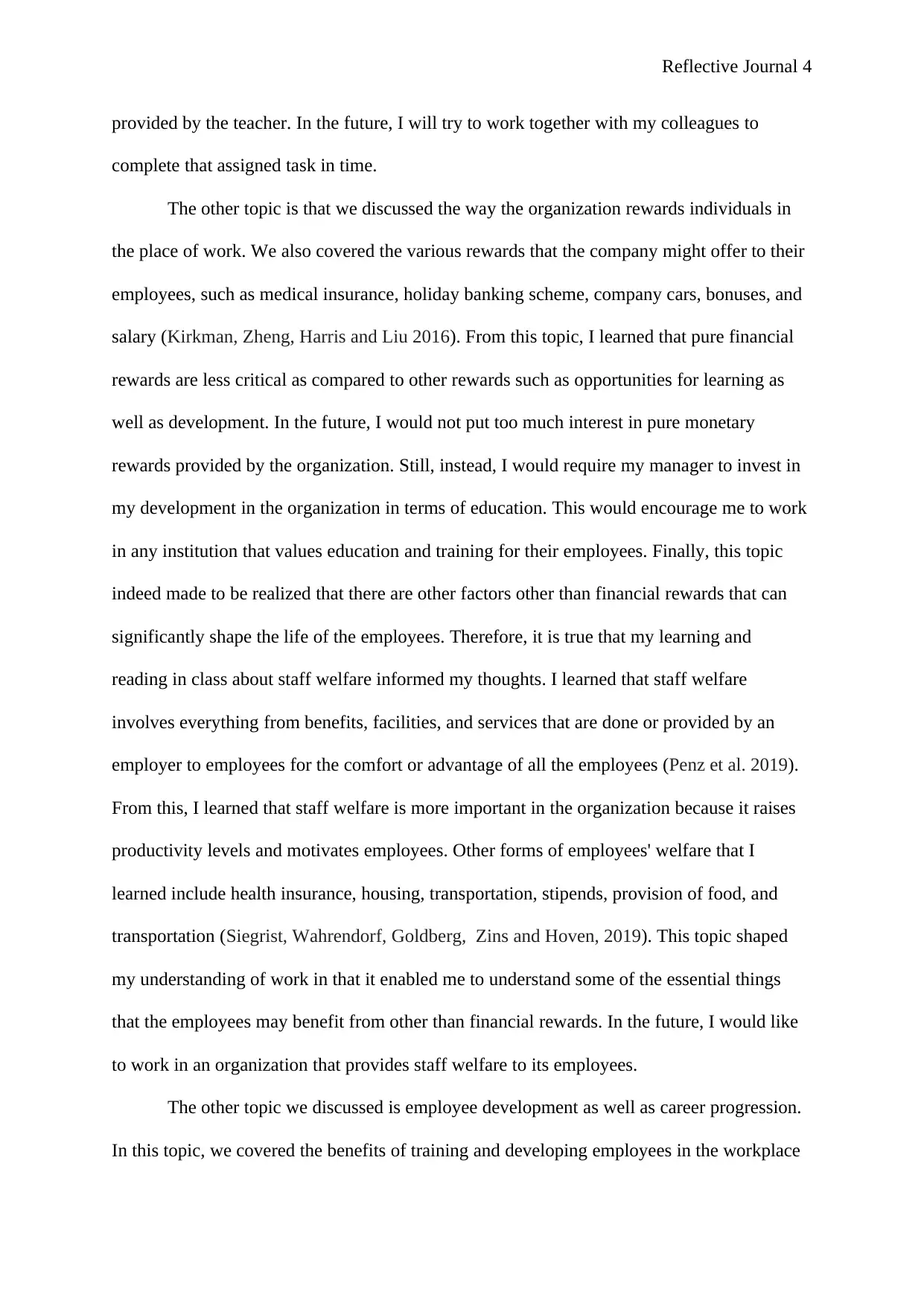
Reflective Journal 4
provided by the teacher. In the future, I will try to work together with my colleagues to
complete that assigned task in time.
The other topic is that we discussed the way the organization rewards individuals in
the place of work. We also covered the various rewards that the company might offer to their
employees, such as medical insurance, holiday banking scheme, company cars, bonuses, and
salary (Kirkman, Zheng, Harris and Liu 2016). From this topic, I learned that pure financial
rewards are less critical as compared to other rewards such as opportunities for learning as
well as development. In the future, I would not put too much interest in pure monetary
rewards provided by the organization. Still, instead, I would require my manager to invest in
my development in the organization in terms of education. This would encourage me to work
in any institution that values education and training for their employees. Finally, this topic
indeed made to be realized that there are other factors other than financial rewards that can
significantly shape the life of the employees. Therefore, it is true that my learning and
reading in class about staff welfare informed my thoughts. I learned that staff welfare
involves everything from benefits, facilities, and services that are done or provided by an
employer to employees for the comfort or advantage of all the employees (Penz et al. 2019).
From this, I learned that staff welfare is more important in the organization because it raises
productivity levels and motivates employees. Other forms of employees' welfare that I
learned include health insurance, housing, transportation, stipends, provision of food, and
transportation (Siegrist, Wahrendorf, Goldberg, Zins and Hoven, 2019). This topic shaped
my understanding of work in that it enabled me to understand some of the essential things
that the employees may benefit from other than financial rewards. In the future, I would like
to work in an organization that provides staff welfare to its employees.
The other topic we discussed is employee development as well as career progression.
In this topic, we covered the benefits of training and developing employees in the workplace
provided by the teacher. In the future, I will try to work together with my colleagues to
complete that assigned task in time.
The other topic is that we discussed the way the organization rewards individuals in
the place of work. We also covered the various rewards that the company might offer to their
employees, such as medical insurance, holiday banking scheme, company cars, bonuses, and
salary (Kirkman, Zheng, Harris and Liu 2016). From this topic, I learned that pure financial
rewards are less critical as compared to other rewards such as opportunities for learning as
well as development. In the future, I would not put too much interest in pure monetary
rewards provided by the organization. Still, instead, I would require my manager to invest in
my development in the organization in terms of education. This would encourage me to work
in any institution that values education and training for their employees. Finally, this topic
indeed made to be realized that there are other factors other than financial rewards that can
significantly shape the life of the employees. Therefore, it is true that my learning and
reading in class about staff welfare informed my thoughts. I learned that staff welfare
involves everything from benefits, facilities, and services that are done or provided by an
employer to employees for the comfort or advantage of all the employees (Penz et al. 2019).
From this, I learned that staff welfare is more important in the organization because it raises
productivity levels and motivates employees. Other forms of employees' welfare that I
learned include health insurance, housing, transportation, stipends, provision of food, and
transportation (Siegrist, Wahrendorf, Goldberg, Zins and Hoven, 2019). This topic shaped
my understanding of work in that it enabled me to understand some of the essential things
that the employees may benefit from other than financial rewards. In the future, I would like
to work in an organization that provides staff welfare to its employees.
The other topic we discussed is employee development as well as career progression.
In this topic, we covered the benefits of training and developing employees in the workplace
Paraphrase This Document
Need a fresh take? Get an instant paraphrase of this document with our AI Paraphraser
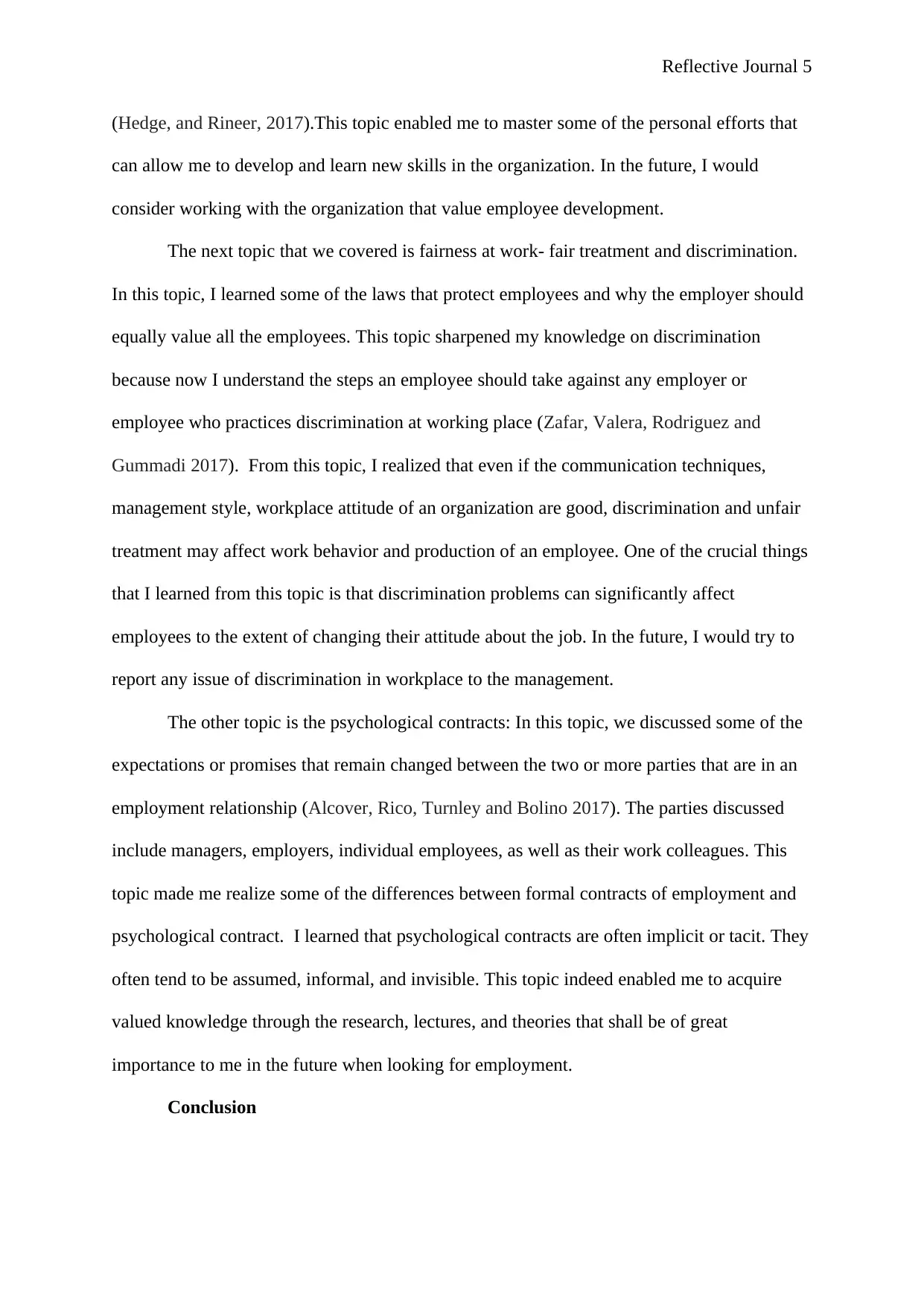
Reflective Journal 5
(Hedge, and Rineer, 2017).This topic enabled me to master some of the personal efforts that
can allow me to develop and learn new skills in the organization. In the future, I would
consider working with the organization that value employee development.
The next topic that we covered is fairness at work- fair treatment and discrimination.
In this topic, I learned some of the laws that protect employees and why the employer should
equally value all the employees. This topic sharpened my knowledge on discrimination
because now I understand the steps an employee should take against any employer or
employee who practices discrimination at working place (Zafar, Valera, Rodriguez and
Gummadi 2017). From this topic, I realized that even if the communication techniques,
management style, workplace attitude of an organization are good, discrimination and unfair
treatment may affect work behavior and production of an employee. One of the crucial things
that I learned from this topic is that discrimination problems can significantly affect
employees to the extent of changing their attitude about the job. In the future, I would try to
report any issue of discrimination in workplace to the management.
The other topic is the psychological contracts: In this topic, we discussed some of the
expectations or promises that remain changed between the two or more parties that are in an
employment relationship (Alcover, Rico, Turnley and Bolino 2017). The parties discussed
include managers, employers, individual employees, as well as their work colleagues. This
topic made me realize some of the differences between formal contracts of employment and
psychological contract. I learned that psychological contracts are often implicit or tacit. They
often tend to be assumed, informal, and invisible. This topic indeed enabled me to acquire
valued knowledge through the research, lectures, and theories that shall be of great
importance to me in the future when looking for employment.
Conclusion
(Hedge, and Rineer, 2017).This topic enabled me to master some of the personal efforts that
can allow me to develop and learn new skills in the organization. In the future, I would
consider working with the organization that value employee development.
The next topic that we covered is fairness at work- fair treatment and discrimination.
In this topic, I learned some of the laws that protect employees and why the employer should
equally value all the employees. This topic sharpened my knowledge on discrimination
because now I understand the steps an employee should take against any employer or
employee who practices discrimination at working place (Zafar, Valera, Rodriguez and
Gummadi 2017). From this topic, I realized that even if the communication techniques,
management style, workplace attitude of an organization are good, discrimination and unfair
treatment may affect work behavior and production of an employee. One of the crucial things
that I learned from this topic is that discrimination problems can significantly affect
employees to the extent of changing their attitude about the job. In the future, I would try to
report any issue of discrimination in workplace to the management.
The other topic is the psychological contracts: In this topic, we discussed some of the
expectations or promises that remain changed between the two or more parties that are in an
employment relationship (Alcover, Rico, Turnley and Bolino 2017). The parties discussed
include managers, employers, individual employees, as well as their work colleagues. This
topic made me realize some of the differences between formal contracts of employment and
psychological contract. I learned that psychological contracts are often implicit or tacit. They
often tend to be assumed, informal, and invisible. This topic indeed enabled me to acquire
valued knowledge through the research, lectures, and theories that shall be of great
importance to me in the future when looking for employment.
Conclusion
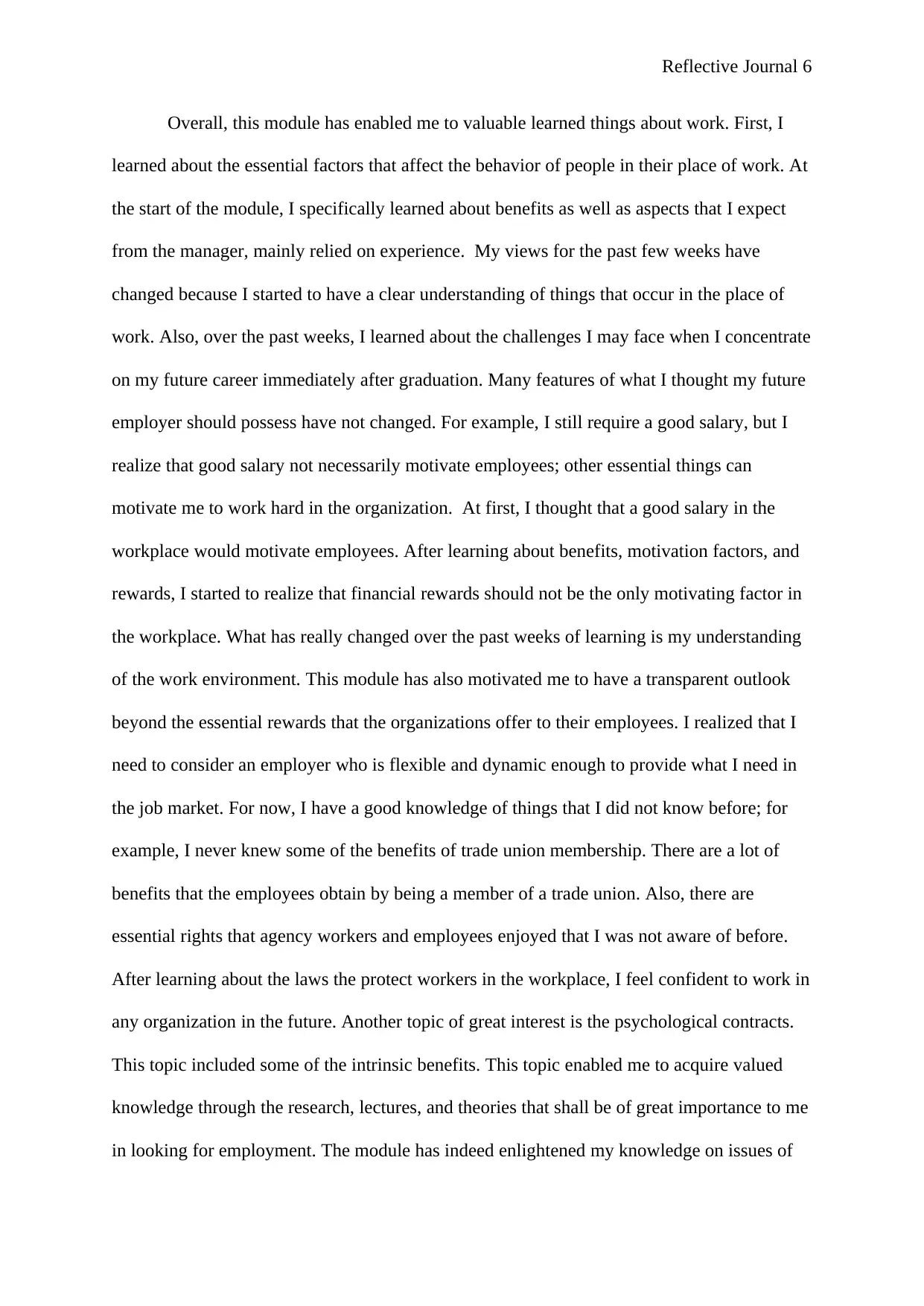
Reflective Journal 6
Overall, this module has enabled me to valuable learned things about work. First, I
learned about the essential factors that affect the behavior of people in their place of work. At
the start of the module, I specifically learned about benefits as well as aspects that I expect
from the manager, mainly relied on experience. My views for the past few weeks have
changed because I started to have a clear understanding of things that occur in the place of
work. Also, over the past weeks, I learned about the challenges I may face when I concentrate
on my future career immediately after graduation. Many features of what I thought my future
employer should possess have not changed. For example, I still require a good salary, but I
realize that good salary not necessarily motivate employees; other essential things can
motivate me to work hard in the organization. At first, I thought that a good salary in the
workplace would motivate employees. After learning about benefits, motivation factors, and
rewards, I started to realize that financial rewards should not be the only motivating factor in
the workplace. What has really changed over the past weeks of learning is my understanding
of the work environment. This module has also motivated me to have a transparent outlook
beyond the essential rewards that the organizations offer to their employees. I realized that I
need to consider an employer who is flexible and dynamic enough to provide what I need in
the job market. For now, I have a good knowledge of things that I did not know before; for
example, I never knew some of the benefits of trade union membership. There are a lot of
benefits that the employees obtain by being a member of a trade union. Also, there are
essential rights that agency workers and employees enjoyed that I was not aware of before.
After learning about the laws the protect workers in the workplace, I feel confident to work in
any organization in the future. Another topic of great interest is the psychological contracts.
This topic included some of the intrinsic benefits. This topic enabled me to acquire valued
knowledge through the research, lectures, and theories that shall be of great importance to me
in looking for employment. The module has indeed enlightened my knowledge on issues of
Overall, this module has enabled me to valuable learned things about work. First, I
learned about the essential factors that affect the behavior of people in their place of work. At
the start of the module, I specifically learned about benefits as well as aspects that I expect
from the manager, mainly relied on experience. My views for the past few weeks have
changed because I started to have a clear understanding of things that occur in the place of
work. Also, over the past weeks, I learned about the challenges I may face when I concentrate
on my future career immediately after graduation. Many features of what I thought my future
employer should possess have not changed. For example, I still require a good salary, but I
realize that good salary not necessarily motivate employees; other essential things can
motivate me to work hard in the organization. At first, I thought that a good salary in the
workplace would motivate employees. After learning about benefits, motivation factors, and
rewards, I started to realize that financial rewards should not be the only motivating factor in
the workplace. What has really changed over the past weeks of learning is my understanding
of the work environment. This module has also motivated me to have a transparent outlook
beyond the essential rewards that the organizations offer to their employees. I realized that I
need to consider an employer who is flexible and dynamic enough to provide what I need in
the job market. For now, I have a good knowledge of things that I did not know before; for
example, I never knew some of the benefits of trade union membership. There are a lot of
benefits that the employees obtain by being a member of a trade union. Also, there are
essential rights that agency workers and employees enjoyed that I was not aware of before.
After learning about the laws the protect workers in the workplace, I feel confident to work in
any organization in the future. Another topic of great interest is the psychological contracts.
This topic included some of the intrinsic benefits. This topic enabled me to acquire valued
knowledge through the research, lectures, and theories that shall be of great importance to me
in looking for employment. The module has indeed enlightened my knowledge on issues of
⊘ This is a preview!⊘
Do you want full access?
Subscribe today to unlock all pages.

Trusted by 1+ million students worldwide
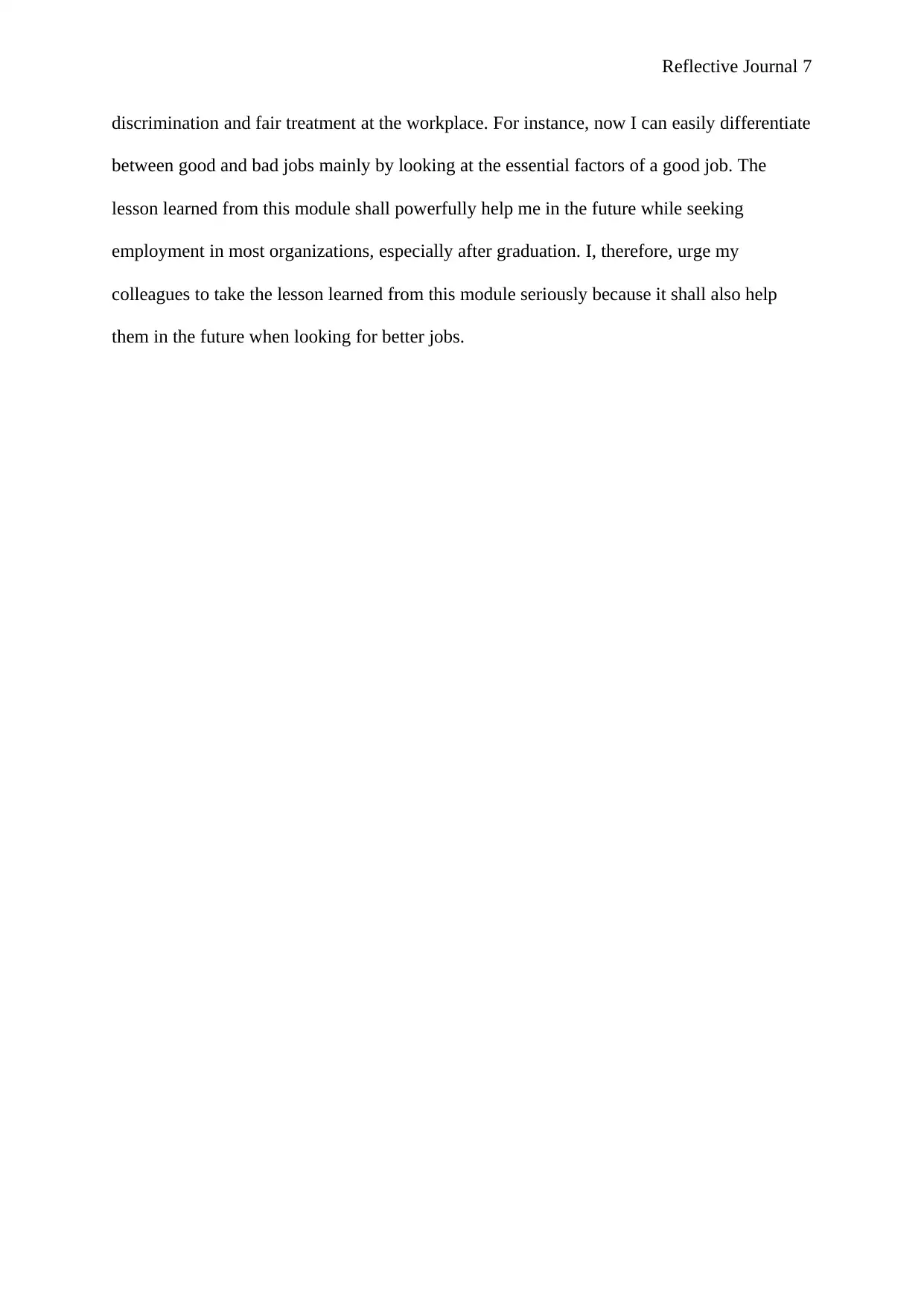
Reflective Journal 7
discrimination and fair treatment at the workplace. For instance, now I can easily differentiate
between good and bad jobs mainly by looking at the essential factors of a good job. The
lesson learned from this module shall powerfully help me in the future while seeking
employment in most organizations, especially after graduation. I, therefore, urge my
colleagues to take the lesson learned from this module seriously because it shall also help
them in the future when looking for better jobs.
discrimination and fair treatment at the workplace. For instance, now I can easily differentiate
between good and bad jobs mainly by looking at the essential factors of a good job. The
lesson learned from this module shall powerfully help me in the future while seeking
employment in most organizations, especially after graduation. I, therefore, urge my
colleagues to take the lesson learned from this module seriously because it shall also help
them in the future when looking for better jobs.
Paraphrase This Document
Need a fresh take? Get an instant paraphrase of this document with our AI Paraphraser
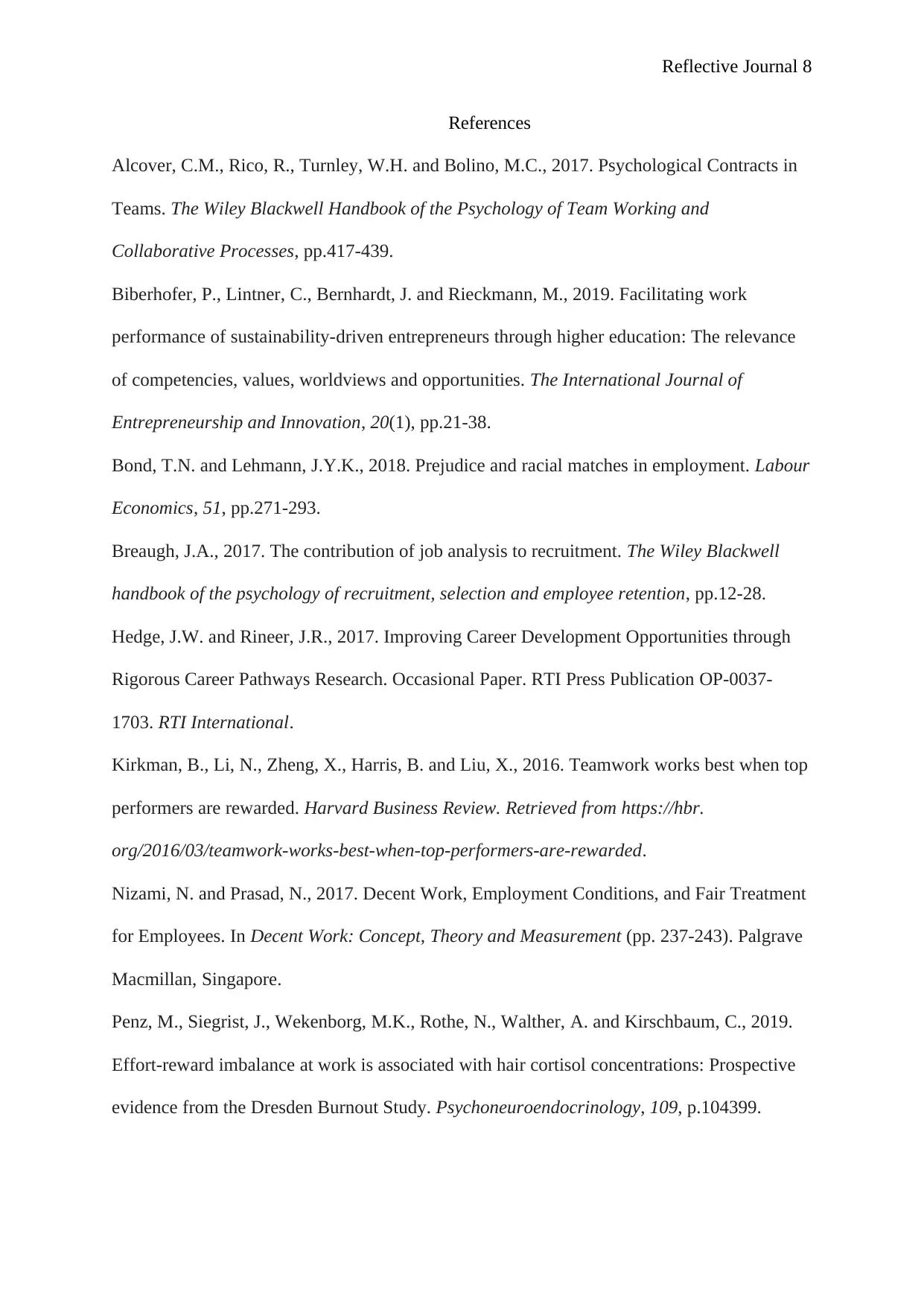
Reflective Journal 8
References
Alcover, C.M., Rico, R., Turnley, W.H. and Bolino, M.C., 2017. Psychological Contracts in
Teams. The Wiley Blackwell Handbook of the Psychology of Team Working and
Collaborative Processes, pp.417-439.
Biberhofer, P., Lintner, C., Bernhardt, J. and Rieckmann, M., 2019. Facilitating work
performance of sustainability-driven entrepreneurs through higher education: The relevance
of competencies, values, worldviews and opportunities. The International Journal of
Entrepreneurship and Innovation, 20(1), pp.21-38.
Bond, T.N. and Lehmann, J.Y.K., 2018. Prejudice and racial matches in employment. Labour
Economics, 51, pp.271-293.
Breaugh, J.A., 2017. The contribution of job analysis to recruitment. The Wiley Blackwell
handbook of the psychology of recruitment, selection and employee retention, pp.12-28.
Hedge, J.W. and Rineer, J.R., 2017. Improving Career Development Opportunities through
Rigorous Career Pathways Research. Occasional Paper. RTI Press Publication OP-0037-
1703. RTI International.
Kirkman, B., Li, N., Zheng, X., Harris, B. and Liu, X., 2016. Teamwork works best when top
performers are rewarded. Harvard Business Review. Retrieved from https://hbr.
org/2016/03/teamwork-works-best-when-top-performers-are-rewarded.
Nizami, N. and Prasad, N., 2017. Decent Work, Employment Conditions, and Fair Treatment
for Employees. In Decent Work: Concept, Theory and Measurement (pp. 237-243). Palgrave
Macmillan, Singapore.
Penz, M., Siegrist, J., Wekenborg, M.K., Rothe, N., Walther, A. and Kirschbaum, C., 2019.
Effort-reward imbalance at work is associated with hair cortisol concentrations: Prospective
evidence from the Dresden Burnout Study. Psychoneuroendocrinology, 109, p.104399.
References
Alcover, C.M., Rico, R., Turnley, W.H. and Bolino, M.C., 2017. Psychological Contracts in
Teams. The Wiley Blackwell Handbook of the Psychology of Team Working and
Collaborative Processes, pp.417-439.
Biberhofer, P., Lintner, C., Bernhardt, J. and Rieckmann, M., 2019. Facilitating work
performance of sustainability-driven entrepreneurs through higher education: The relevance
of competencies, values, worldviews and opportunities. The International Journal of
Entrepreneurship and Innovation, 20(1), pp.21-38.
Bond, T.N. and Lehmann, J.Y.K., 2018. Prejudice and racial matches in employment. Labour
Economics, 51, pp.271-293.
Breaugh, J.A., 2017. The contribution of job analysis to recruitment. The Wiley Blackwell
handbook of the psychology of recruitment, selection and employee retention, pp.12-28.
Hedge, J.W. and Rineer, J.R., 2017. Improving Career Development Opportunities through
Rigorous Career Pathways Research. Occasional Paper. RTI Press Publication OP-0037-
1703. RTI International.
Kirkman, B., Li, N., Zheng, X., Harris, B. and Liu, X., 2016. Teamwork works best when top
performers are rewarded. Harvard Business Review. Retrieved from https://hbr.
org/2016/03/teamwork-works-best-when-top-performers-are-rewarded.
Nizami, N. and Prasad, N., 2017. Decent Work, Employment Conditions, and Fair Treatment
for Employees. In Decent Work: Concept, Theory and Measurement (pp. 237-243). Palgrave
Macmillan, Singapore.
Penz, M., Siegrist, J., Wekenborg, M.K., Rothe, N., Walther, A. and Kirschbaum, C., 2019.
Effort-reward imbalance at work is associated with hair cortisol concentrations: Prospective
evidence from the Dresden Burnout Study. Psychoneuroendocrinology, 109, p.104399.
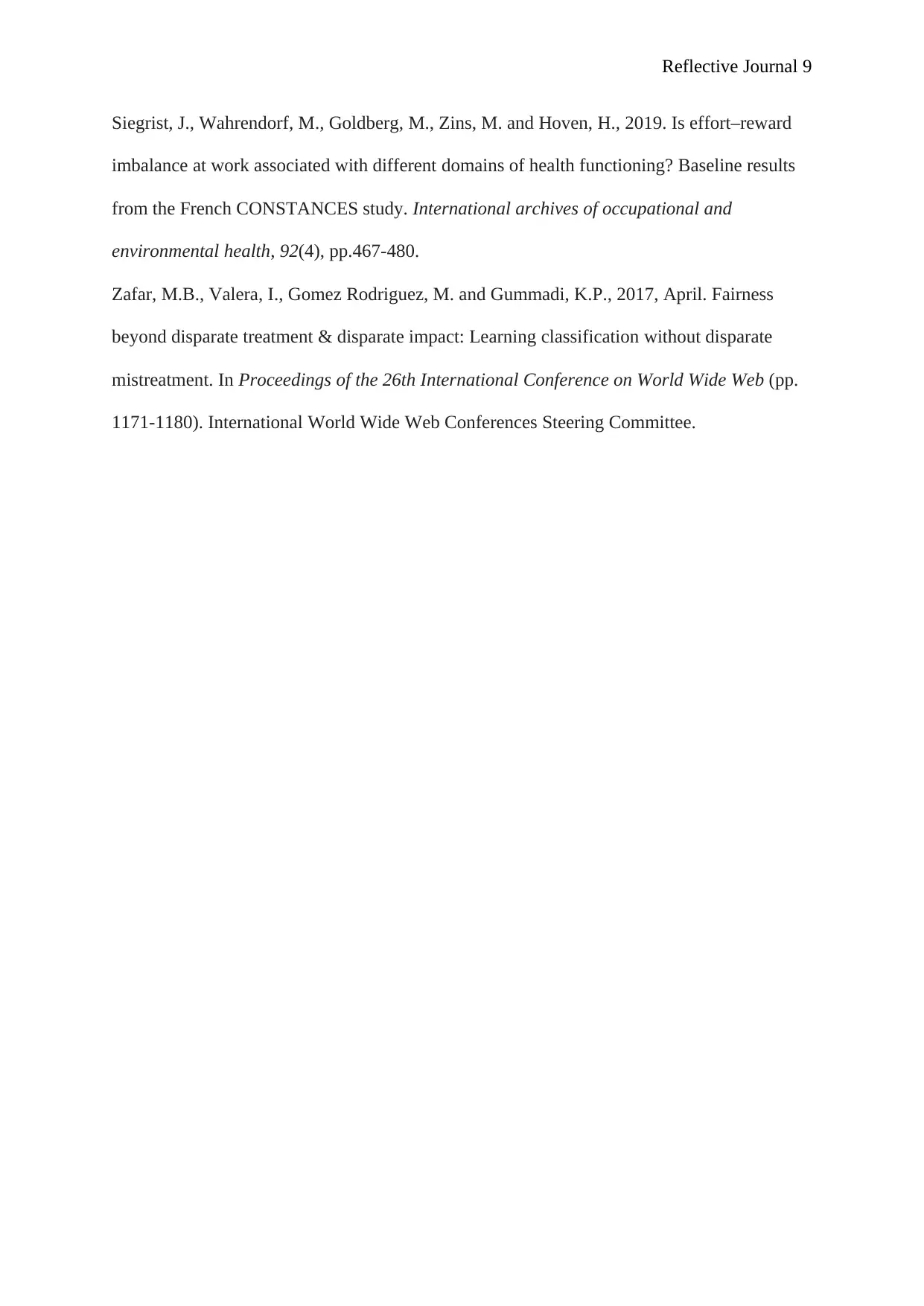
Reflective Journal 9
Siegrist, J., Wahrendorf, M., Goldberg, M., Zins, M. and Hoven, H., 2019. Is effort–reward
imbalance at work associated with different domains of health functioning? Baseline results
from the French CONSTANCES study. International archives of occupational and
environmental health, 92(4), pp.467-480.
Zafar, M.B., Valera, I., Gomez Rodriguez, M. and Gummadi, K.P., 2017, April. Fairness
beyond disparate treatment & disparate impact: Learning classification without disparate
mistreatment. In Proceedings of the 26th International Conference on World Wide Web (pp.
1171-1180). International World Wide Web Conferences Steering Committee.
Siegrist, J., Wahrendorf, M., Goldberg, M., Zins, M. and Hoven, H., 2019. Is effort–reward
imbalance at work associated with different domains of health functioning? Baseline results
from the French CONSTANCES study. International archives of occupational and
environmental health, 92(4), pp.467-480.
Zafar, M.B., Valera, I., Gomez Rodriguez, M. and Gummadi, K.P., 2017, April. Fairness
beyond disparate treatment & disparate impact: Learning classification without disparate
mistreatment. In Proceedings of the 26th International Conference on World Wide Web (pp.
1171-1180). International World Wide Web Conferences Steering Committee.
⊘ This is a preview!⊘
Do you want full access?
Subscribe today to unlock all pages.

Trusted by 1+ million students worldwide
1 out of 9
Related Documents
Your All-in-One AI-Powered Toolkit for Academic Success.
+13062052269
info@desklib.com
Available 24*7 on WhatsApp / Email
![[object Object]](/_next/static/media/star-bottom.7253800d.svg)
Unlock your academic potential
Copyright © 2020–2026 A2Z Services. All Rights Reserved. Developed and managed by ZUCOL.





